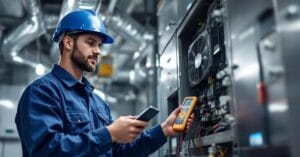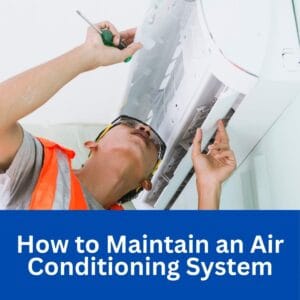

Cleaning your AC coils is a critical part of HVAC system maintenance. Regular cleaning and proper maintenance of all ac units are essential to ensure efficient operation, prevent costly repairs, and extend the lifespan of your system. But one question many homeowners and facility managers ask is: How long should I wait before switching on the air conditioner after coil cleaning? Whether you’re dealing with evaporator coils or condenser coils, the wait time can significantly impact your system’s efficiency, airflow, and even its overall lifespan.
Let’s explore the right time to restart your AC unit after coil cleaning and why it matters more than you think. Proper maintenance, including waiting the correct amount of time before restarting ac units, is crucial for their longevity and efficiency.
Your air conditioner relies on two main types of coils—evaporator coils in the indoor unit and condenser coils in the outdoor unit (this applies to most air conditioners, regardless of how they are installed). These coils are essential for transferring heat, allowing your AC system to cool the air efficiently.
Evaporator coils absorb heat from your indoor space.
Condenser coils release that heat to the outside environment.
Properly installed and well-maintained coils are crucial for the optimal performance of air conditioners. When these coils are dirty or clogged with dust, debris, or dirt, your AC struggles to perform, resulting in reduced cooling capacity and higher energy consumption.
Over time, AC coils accumulate moisture, dust, and even oily residues. This buildup leads to:
Reduced airflow
Corrosion of the aluminum fins
Overheating of the compressor
Higher power usage
Shortened unit lifespan
Increased likelihood of needing repair or professional servicing if coils are not cleaned regularly
Regular coil cleaning helps save money, improve efficiency, and ensure your system performs optimally all year round.
A dirty evaporator coil can quietly undermine your air conditioner’s performance and efficiency. Here are some telltale signs that your evaporator coil may need cleaning:
Reduced cooling capacity: If your air conditioner isn’t cooling your space as effectively as before, dirty coils could be to blame. Dust and grime on the coil act as insulation, making it harder for the system to absorb heat from the air.
Increased energy bills: When the evaporator coil is coated with dirt, your system has to work harder to maintain the desired temperature, leading to higher energy consumption and utility costs.
Decreased airflow: Blocked or dirty coils restrict the flow of air through your system, resulting in weak or uneven airflow from your vents.
System working harder: A clogged coil forces your air conditioner to run longer cycles, increasing wear and tear on components and potentially shortening the lifespan of your unit.
Frequent repairs or breakdowns: Ignoring coil cleaning can lead to more frequent repairs and, in severe cases, premature system failure.
Regular evaporator coil cleaning is essential to prevent these issues, maintain optimal airflow and efficiency, and avoid unnecessary repairs. Keeping your coils clean ensures your air conditioner delivers reliable comfort and helps you save money on energy and maintenance costs.

Depending on your comfort level and the coil condition, coil cleaning can be a DIY task or handled by a professional HVAC technician. Typical cleaning methods include:
Spraying compressed air to dislodge surface debris
Washing with warm water and mild detergent
Using a vacuum with a brush attachment for dry particles
Rinsing with clean water to remove detergent or commercial cleaners
Applying foam-based commercial cleaners that expand to fill spaces between coil fins, lifting dirt and grime from hard-to-reach areas
Always turn off power to the unit before cleaning, and follow the manufacturer’s guidelines for accessing sensitive components.
Some cleaning methods use liquids such as detergents or specialized solutions, while others use foam or dry methods like compressed air.
You can also take professional help like AC Tune Up Near Me.
Power off your AC to prevent electrical hazards.
Remove the air filter and access the evaporator and condenser coils; cleaning the interior of the unit is essential for thorough maintenance.
Clear out loose dust and dirt using compressed air or a vacuum.
Apply a mild detergent solution and scrub gently.
Gently wipe the coils and other interior components with a soft cloth to remove loosened dirt and grime.
Rinse thoroughly with clean water to remove soap and debris.
Let all components dry completely—especially any moisture on or around electrical parts.
You should wait at least 30 to 60 minutes after coil cleaning before switching your AC back on (in some cases, waiting several hours—such as 6 to 24 hours—may be recommended, depending on the cleaning method and humidity). You should never turn the AC on immediately after cleaning, as this can cause damage. The most important factor is ensuring all components, especially the evaporator and condenser coils, are completely dry.
If excess water remains on the coils, it can:
Cause electrical short circuits
Promote mold growth
Block airflow, leading to reduced cooling capacity
Damage internal components
In humid environments, consider waiting even longer—or use a fan to speed up drying. If needed, using a dryer, such as a hair dryer, can help accelerate the drying process.
Switching your AC on too early after cleaning may seem harmless, but it can create lasting issues: All acs require sufficient drying time after coil cleaning to prevent damage and maintain efficiency.
Moisture in electrical components may cause damage.
Dirt or debris not fully removed may be recirculated into the air.
Wet coils won’t radiate heat effectively, reducing your AC’s efficiency.
Dampness can lead to internal corrosion, mold, and poor air quality.
Waiting gives your system the protection it needs to operate at its best.
Proper coil cleaning is only half the battle—what you do afterward is just as important for your air conditioner’s health. Avoid these common mistakes to keep your system running smoothly:
Turning the AC on too soon: Always wait at least 30 minutes to an hour after cleaning to ensure the evaporator coils are completely dry. Switching the system on while the coils are still wet can cause electrical issues and damage other parts of the unit.
Using too much water or cleaning solution: Excessive moisture or harsh commercial cleaners can harm the coils or seep into sensitive components. Stick to recommended amounts and always follow the manufacturer’s instructions.
Neglecting the air filter: A dirty or clogged air filter can quickly undo your cleaning efforts by allowing dust and debris to settle back onto the coils. Clean or replace the air filter regularly as part of your maintenance routine.
Ignoring the condenser coils: Focusing only on the evaporator coil and forgetting the condenser coils can lead to reduced system efficiency. Both sets of coils need regular cleaning for optimal performance.
Skipping inspection for damage or corrosion: After cleaning, always check the coils for signs of corrosion or physical damage. Addressing these issues early can prevent more serious problems down the line.
Not following maintenance guidelines: Each air conditioner has specific requirements. Failing to adhere to the manufacturer’s maintenance instructions can reduce efficiency and may even void your warranty.
Improper use of commercial cleaners: If you use commercial cleaners, make sure to apply them as directed. Incorrect use can damage the coils or other system components.
By steering clear of these mistakes, you’ll help ensure your air conditioner’s coils stay clean, your system remains efficient, and you avoid unnecessary repairs or downtime.
Check and clean the air filter or replace it if it’s clogged. Regular maintenance of air filters is crucial to prevent contamination of coils and to ensure efficient operation of your system.
Inspect other components like the drain, fins, and refrigerant lines.
Make sure the outdoor unit is free from debris, leaves, and obstruction.
Don’t skip reading the manufacturer’s instructions for post-cleaning operation.
Test the AC unit only when you’re confident everything is dry and reassembled.
To keep your AC system running smoothly:
Schedule regular cleaning every 3–6 months, especially before summer.
Avoid planting shrubs too close to the outdoor unit—they restrict airflow.
Keep the area around your AC free of dust, trash, or construction debris.
Use smart thermostats to prevent overuse and save energy.
Call for HVAC services at the start and end of each season.
DIY cleaning is doable, but certain scenarios call for expert help:
A professional HVAC technician ensures a thorough job while preserving your system’s warranty and efficiency.
Are you seeking an professional AC Contractor? Do you want to save money on cleaning and servicing? We can be your help. Air United Mechanical is your the solution of your problem! Call us at 2817190722.
Coil cleaning is essential for your air conditioner’s health and energy savings, but timing is just as critical. Always wait until the coils are completely dry—usually about 30 to 60 minutes—before switching your AC back on. This simple step protects your unit, boosts performance, and helps maintain clean, cool air throughout the season.
Take the time to do it right. Your HVAC system, wallet, and comfort will thank you.
Is your AC ready for the season? Don’t wait until the heat hits to find out! Schedule your AC tune-up with Air United Mechanical today and ensure your system runs efficiently and reliably. Our expert technicians will keep your home cool and comfortable while saving you money on energy bills. Click now to book your appointment—your comfort is just a call away!
Learn more about our AC Maintenance and Air Conditioning Services;




